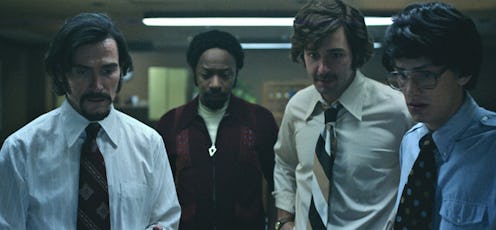
It's been 44 years since Dr. Philip G. Zimbardo's infamous look into authority and behavior, and a new film, The Stanford Prison Experiment , brings the study to life, showing the events as they occurred over that fateful six-day period. Zimbardo served as a consultant on the movie, and over the course of the film, viewers witness the psychologist (played by Billy Crudup) morph from a rational researcher to an actively involved participant in the experiment, entrenched in his role as warden of the "prison." Speaking with Bustle, Zimbardo revealed that his own experiences from the experiment are as fascinating — and valuable — as those of his young subjects.
One moment in particular, which occurred several days into the study, had an especially notable effect, the researcher says. Zimbardo and his colleagues got word that a recently released "prisoner" was planning to break into the jail with some friends and liberate the other prisoners. Explains Zimbardo, "That was a rumor. We believed it without really checking on it because we were so overstressed."
As the research team attempted to figure out how to deal with the potential break-in, a friend and colleague of Zimbardo's dropped by to casually inquire about the experiment. Zimbardo recalls this moment, saying, "I’m trying to get rid of him, and then he says the most natural thing a psychologist would say: 'What is the independent variable in the study? What are you manipulating?' And obviously the simple answer I should’ve just given him was 'the random assignment to prisoner or guard.'"
But Zimbardo had reached a point where he was now viewing the experiment as an actual prison of which he was warden, as opposed to an academic study of which he was the responsible overseer. So he reacted to the question as if it were an absurd intrusion. Zimbardo says his mindset at that moment was, "I want to get this guy the hell out of here because I don’t now how to deal with him and the invaders. So I lose it — like, 'Who cares?!'"
It was only later that Zimbardo, who would go on to write a book about the experiment called The Lucifer Effect , reflected back on this moment and realize how skewed his perception had been of the experiment as reality.
Another crucial moment was when Zimbardo's eyes were finally opened to how out of control the experiment — and his role in it — had gotten. His girlfriend, Christina (played in the movie by Olivia Thirlby), came by the "prison" and expressed dismay at the conditions.
Recalls Zimbardo, "Essentially she said, 'The boys are suffering, and you are responsible. And they’re not prisoners, they're not guards, they’re boys, and you have to realize how far you have changed."
Zimbardo has noted that, out of every person who witnessed the experiment, his then-girlfriend (who is now his wife) was the only person who ever called him out for the path that the experiment had taken. This confrontation was the last scene to be filmed for Stanford , and director Kyle Patrick Alvarez expressed to Bustle that it was also one of the best things to shoot.
Having experienced firsthand the intoxicating effect that a position of authority can have, Zimbardo hopes that the film and his personal experiences will raise awareness in viewers about the potential for abuse when power is unregulated.
Says Zimbardo, "I think the movie will create a new sensibility about all of the domains in which people are given power who can abuse it. As in corrections, as in all of the problems now with police brutality... and again, it's even rethinking our education system, where many teachers abuse their position and mistreat students. So ideally, people step back and say, 'What can I do to prevent this excess negative use of power?' and 'Where there's power, how can people use it for good, for building community rather than in this destructive way?'"
These are some great questions, and even if The Stanford Prison Experiment doesn't provide all the answers, it will undoubtedly encourage its viewers to find them out for themselves.
Images: IFC Films (2)